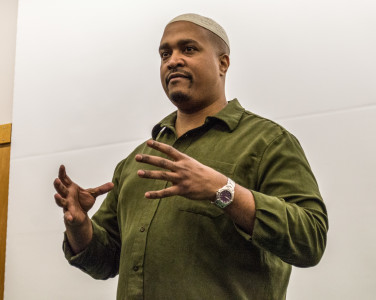On Thursday night, Tarell Rodgers ’93, a consultant with the U.S. Department of Labor, gave a talk entitled, “Don’t Run, Embrace It All,” in which he spoke about his struggle to develop a sense of purpose and self after graduating and his eventual realization of himself through spirituality. Rogers was invited to come speak by the Office of Intercultural Engagement, with additional sponsorship from the Peace and Conflict Studies Program, the Rosenfield Program and the Office of Alumni Relations.
Rodgers began the talk by briefly explaining his Sufi Muslim faith and followed with a meditative prayer.

Photo by Jun Taek Lee.
“Sufis are the mystical branch of Islam, and we believe in a direct experience with the divine, or with God, and we just say certain things to make that happen. Just follow along, feel the vibration the best that you can, and then I’ll give you the story itself,” Rodgers instructed.
Reflecting on his arrival at Grinnell decades ago, Rodgers said as a prospective student he was impressed by the openness of the College. However, this openness and the academic rigor came to challenge him as a student.
“I could come from the heart, but I couldn’t actually put an argument together,” Rodgers said of his writing abilities, adding that his exposure to different racial, sexual and economic identities in Grinnell’s safe environment led to a crisis of self.
This was compounded, according to Rodgers, by the seeming impossibility of finding a suitable job after Grinnell. Working as an auditor in a hotel for $10 an hour, he eventually found himself fighting and drinking. After a felony conviction, he and his girlfriend skipped bail to teach English in Mexico.
However, their lack of stormproof accommodations forced a trip back over the border during Hurricane Stan. He was incarcerated upon attempting reentry, but Rogers sees this as a positive occurrence in hindsight.
During his time at Grinnell, Rodgers said, “No one really helped me find who I was as a man. By the time I was done, I was deficit in that truest thing—‘Who am I?’” He emphasized that he did not learn soft skills, such as interpersonal and emotional intelligences, and that he needed to feel a sense of self and purpose, naming this as something that the College fails to help students develop.
“We produce some of the strongest and [most] amazing minds, but as people, I find that [Grinnellians] are relatively lost,” Rodgers said.
Rogers found his calling, however, and it delivered him from his incarceration. He was offered the ability to earn a Masters in Education through Aurora University, with the condition that he help gang members achieve work release. He now manages similar work release programs as a consultant for the Department of Labor.
Attendee Mari Holmes ’17 said that she enjoyed Rodgers’ presentation due to his transparency, which according to Holmes is uncommon among speakers at the College, and in general. The questions that Rodgers asked himself, about happiness and purpose at Grinnell and beyond, resonated with Holmes’ own struggles
“I think a lot more Grinnellians struggle with those questions as well, but just because of the culture [at Grinnell] and just because of this unsaid peer pressure we have among us, I think it’s something we don’t want to talk about. We don’t want to be that vulnerable with each other, ask for help and realize the thing we are doing is probably not the thing we want to do,” Holmes said.






















































